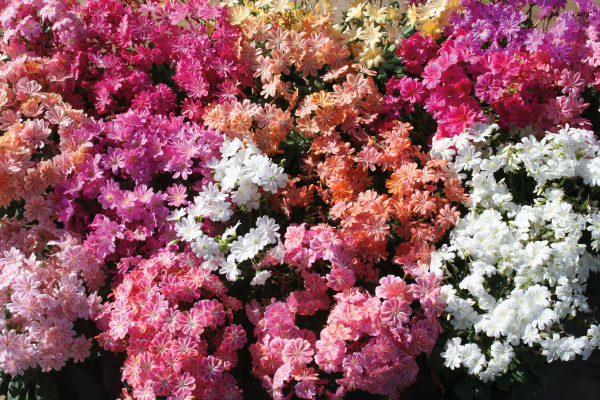

Elise
- FastraX perennial: First year flowering without vernalization
- Fleuroselect Gold Medal winners in the series
- Long flowering season
- Heat and drought tolerant
- Lighting up beds, containers and rock gardens
Technical Guide: Click here
All information in our technical guide is based on our own trials and would therefore be as guideline only. Detailed cultivation aspects vary depending on climate, location, time of year and environmental conditions. Benary expressly disclaims any responsibility for the content of such data/information and makes no representation or warranty for the cultivation of any products listed. It is recommended that growers conduct a trial of products under their own conditions.
- Crop Time
- Spring: 18 - 22 weeks
- Height ∅
- 5 ″ / 13 cm
- Width ∅
- 7 ″ / 18 cm
- Exposure
- Sun - Partial shade
- Seed Form
- ApeX
- Heat Zone
- undetermined
- Hardiness Zone
- 3a-8b
- Best Uses
- Bedding, Rockery
Culture guide
Sow time
18-22 weeks from sowing to flower
Sowing method
1 seed per plug. Cover seed with a light layer of medium vermiculite.
Germination
Maintain 18-20 °C (64-68 °F) and optimum conditions for seedling development, beginning on the day of sowing until radicle emergence. Expect radicle emergence in 14-21 days.
Growing on
Grow the plants cooler after transplanting at 10-18 °C (50-64 °F). Maintain an even moisture level , but allow the media to reach a medium (2) before re-saturating to a moist (3).
Media
pH 5.5-5.8. Maintain EC 1.2-1.5. Excessive N can lead to stretching and soft growth. Fertilize weekly using a complete fertilizer (15-5-15) or a 17-5-17 under high light levels at 150 ppm N.
Temperature
Grow at 12-18 °C or outdoors. In winter indoors frost free at 3-5 °C or outdoors. Outdoor fleece cover needed. In spring the plants start to grow for 4-8 weeks at 15-18 °C. Cold temperatures at 7-14 °C will increase the cultivation time. A chilling period (vernalization) is required for flower initiation
Fertilization
Low-moderate fertilization levels are required. Fertilize the crop weekly with 100-150 ppm nitrogen (at 2 kg/m³ slow release fertilizer in substrate), using a complete balanced fertilizer. Avoid high ammonium and high nitrogen levels. Don’t fertilize after mid September. In spring fertilize 100-150 ppm nitrogen of a complete balanced fertilizer. Prevent magnesium deficiency by applying magnesium sulphate (0,05 %) 1-2 times and in case of iron deficiency (above pH 6.0) apply iron-chelate for 1-2 times.
Stage I Starts with the radicle breaking through the testa. The roots are touching the medium. Ends with fully developed cotyledons.
Stage II Starts from fully developed cotyledons. Ends with the fully developed true leaf or true leaf pair.
Stage III Starts from the fully developed true leaf or true leaf pair and ends with 80% of the young plants being marketable.
Stage IV All young plants are ready for sale and in the process of being hardened off. This stage lasts about 7 days.
The cultural recommendations are based on results from trials conducted under Central European conditions. Different conditions in other parts of the world may lead to deviations in results achieved.




